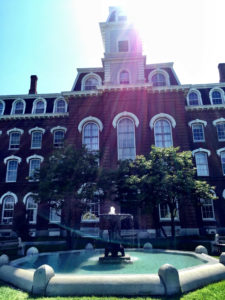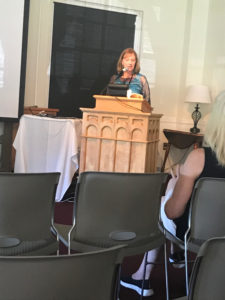Learning and Teaching (And All That’s In Between) by Carla Damron
Imagine a small college campus in Montpelier, Vermont. You arrive from South Carolina to be joined by writers from all over the country. You are there for one week, and during that time, you will immerse yourself in writing—your own projects, works by others, and works by the masters. You attend classes and readings done by incredible poets, short story authors, memoirists, and novelists.

Vermont College of Fine Arts
You begin each day (after a sad, sad breakfast) with a writing exercise to get your creative blood awake and flowing. Then you join the others in your small writing workshop—people who write what you write– and are ready to engage in in-depth analysis and critiques.
You have prepared for this, or at least, you hope you have. You’ve received twenty-five pages of fiction from each of the five other workshop participants. You’ve read and reread these works and prepared your comments. As a group, you will spend several hours discussing each submission. Yours, too, will be fodder for critique.
The instructor for your workshop is Connie May Fowler. You had heard of her, and read one of her books in preparation. You’ve already decided she’s freaking brilliant and NOW YOU GET TO WORK WITH HER.
Connie sets up workshop in a very different way than you’ve experienced before. She uses a whiteboard, and asks the writer being critiqued to read a little to the group. Then she says, “What questions do you have for the readers?” she writes these down, then the critiquers offer their questions or issues they wish to discuss about the work, which also go on the whiteboard.
You then go through this list and discuss the work. This sets a wonderful tone for the critique process. Nobody dominates. Everyone has a spirit of helpfulness and enthusiasm. Nobody is there to skewer and attack. The group only wants to help the writer create the best work they can.
And it’s FUN. You eat chocolate and love the energy of this gathering. When it’s your turn to be critiqued, you listen, and absorb, and realize, A) your work has potential, B) these characters have more to tell you and C) you really, absolutely, positively, have to work on your openings.

Each Participant Does Formal Reading. Thanks, Beth Johnson, for photo!
This was my life, ladies and gentlemen, in the middle of August. I could go on and on about the brilliant faculty (Matthew Dickman, Jamaal May and Patricia Smith are deities). I could tell you about how I’m too old for dorm life (who decided that bricks make good mattresses?) and how I developed friendships that I hope last for eternity. But instead, I want to talk about learning. And teaching.
I was a learner for this week, and I feel expanded. I have new momentum for my work-in-progress, and everyday I itch to get back to it. I’ve reread my notes from Connie and my critique gang and have a good idea what must be done to continue to draft and revise this project. It’s been remarkably energizing, and I’m a better writer for it.
Later this month, I get to be a teacher. I’m part of the faculty for the Pat Conroy Literary Center’s Writers Retreat. My session will be on revision. http://patconroyliterarycenter.org/second-writers-retreat-at-the-anchorage-inn-beaufort-sc/
I don’t consider myself an expert because, like my writing project, I’m a work-in-progress. I will share what I learned in graduate school and from each of the novels I’ve birthed. I’ll talk about immersing oneself into characters so they will tell you what you need to know. We’ll explore the beauty of tension, nuanced and overt. We will discuss the flow of our narrative and ways to make it resonate.
And we’ll talk about how each step of the writing process, from pondering to drafting to revising, not only enhances our work, but expands our selves. I have learned from each work I’ve written—about writing, about grief, about obsession, about love. I want my fellow retreaters to experience that, too. It’s a quiet gift this writing journey offers us.
In our Vermont workshop, Connie May Fowler (did I mention she was brilliant?) said, and she may have been quoting someone else, “Writing is an act of forgiveness. Revision is an act of redemption.”
I heard you, Connie. And I hope to breathe those words into my session at the retreat.
What has helped you in the revision process? Do you have one tip you’d like to share?
